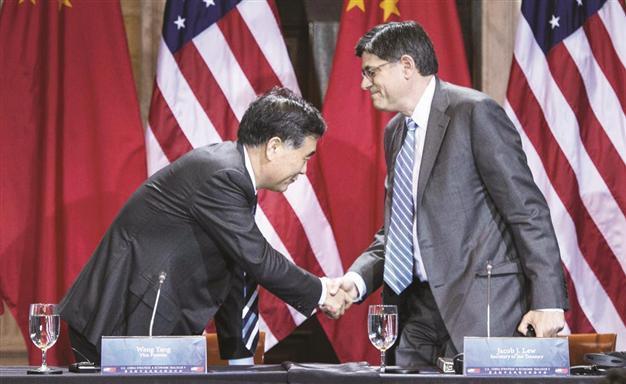US, China set to revive deal talks
WASHINGTON - Reuters

Chinese Vice Premier Wang Yang (L) and US Secretary of the Treasury Jack Lew rise from their chairs while shaking hands during the closing session of the US and China Strategic and Economic Dialogue talks.
The United States and China agreed to restart stalled negotiations on an investment treaty, with Beijing dropping previous efforts to protect certain sectors of its economy from the start.The agreement to resume negotiations was welcomed by the U.S. business community as a major advance during annual Strategic and Economic Dialogue talks in Washington, which have often produced few agreements of substance.
Top officials from both sides strived to project a friendly, businesslike tone as they tried to build what China calls a “new model of major country relations” between the world’s two biggest economies in the first year of Chinese President Xi Jinping’s mandate.
But talks struck a sour note over China’s handling of former spy agency contractor Edward Snowden, who hid out in the Chinese territory of Hong Kong last month as he revealed a secret U.S. surveillance program before fleeing to Russia.
Disputes over cyber security topped the agenda going into this year’s talks, which were launched in 2008 to manage a relationship that was growing more complex and tense with China’s emergence as major economic and military power.
U.S. Treasury Secretary Jack Lew hailed the investment treaty commitment as a sign of positive change in Beijing as China retools its economic growth model away from heavy investment and exports toward growth driven by consumption.
“China announced its intention to negotiate a high standard bilateral investment treaty with us that will include all stages of investment and all sectors - a significant breakthrough, and the first time China has agreed to do so with another country,” he said as the talks concluded.
5-year halt
China and the United States began negotiations on a pact to govern bilateral investment in 2008 under then-U.S. President George W. Bush, but discussions were put on hold after President Barack Obama took office the following year.
Previously, Beijing had agreed to talks only if certain Chinese industries, especially in its service sector, were exempt. But it agreed to drop blanket restrictions for the current talks, a U.S. Treasury official said.
The official, briefing reporters at the U.S.-China economic talks, said the move was an encouraging sign the world’s second-largest economy was willing to open up more sectors to foreign competition.
Chinese Commerce Minister Gao Hucheng told reporters China and the United States shared “a common purpose, which is to try to find ways to reduce and mitigate differences and barriers that both sides place in our trade and investment relations.” Explaining China’s motives for reopening the investment talks, Chinese Vice Finance Minister Zhu Guangyao said China had about $20 billion of direct investment in the United States and $1.2 trillion in U.S. treasury bills.
“With such an extensive investment relationship, it is necessary for the two sides to have an institutional environment for the protection of these investments,” he told reporters.
In addition, Zhu said, “Business leaders from China and the United States have a strong desire to invest in the market of the other. They both want an open and more transparent market.” Analysts and U.S. officials said another factor was a relative reversal of fortunes from previous years, with the United States enjoying economic recovery while China grappled with a slowing economy that showed the limits of its model.
Business groups pleased
“This set of meetings, as many of the meetings that I’ve had in recent months have had this character to them, that there’s a renewed recognition and respect for the resilience of the American economy,” said Lew.
U.S. business groups welcomed the agreement, but warned that both sides still faced many other tough issues and that negotiations on a treaty could be lengthy. Any pact would need to be ratified by the U.S. Senate. “The U.S. Chamber called for this last year as a pre-condition, and we are very pleased that both governments rose to the challenge,” said Myron Brilliant, head of international affairs at the U.S. Chamber of Commerce.
















